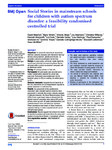Social Stories in mainstream schools for children with autism spectrum disorder: a feasibility randomised controlled trial
| dc.contributor.author | Marshall, D | |
| dc.contributor.author | Wright, B | |
| dc.contributor.author | Allgar, Victoria | |
| dc.contributor.author | Adamson, J | |
| dc.contributor.author | Williams, C | |
| dc.contributor.author | Ainsworth, H | |
| dc.contributor.author | Cook, L | |
| dc.contributor.author | Varley, D | |
| dc.contributor.author | Hackney, L | |
| dc.contributor.author | Dempster, P | |
| dc.contributor.author | Ali, S | |
| dc.contributor.author | Trepel, D | |
| dc.contributor.author | Collingridge Moore, D | |
| dc.contributor.author | Littlewood, E | |
| dc.contributor.author | McMillan, D | |
| dc.date.accessioned | 2021-08-09T11:20:55Z | |
| dc.date.available | 2021-08-09T11:20:55Z | |
| dc.date.issued | 2016-08 | |
| dc.identifier.issn | 2044-6055 | |
| dc.identifier.issn | 2044-6055 | |
| dc.identifier.other | ARTN e011748 | |
| dc.identifier.uri | http://hdl.handle.net/10026.1/17469 | |
| dc.description.abstract |
OBJECTIVES: To assess the feasibility of recruitment, retention, outcome measures and intervention training/delivery among teachers, parents and children. To calculate a sample size estimation for full trial. DESIGN: A single-centre, unblinded, cluster feasibility randomised controlled trial examining Social Stories delivered within a school environment compared with an attentional control. SETTING: 37 primary schools in York, UK. PARTICIPANTS: 50 participants were recruited and a cluster randomisation approach by school was examined. Participants were randomised into the treatment group (n=23) or a waiting list control group (n=27). OUTCOME MEASURES: Acceptability and feasibility of the trial, intervention and of measurements required to assess outcomes in a definitive trial. RESULTS: An assessment of the questionnaire completion rates indicated teachers would be most appropriate to complete the primary outcome measure. 2 outcome measures: the Social Responsiveness Scale (SRS)-2 and a goal-based measure showed both the highest levels of completion rates (above 80%) at the primary follow-up point (6 weeks postintervention) and captured relevant social and behaviour outcomes. Power calculations were based on these 2 outcome measures leading to a total proposed sample size of 180 participant groups. CONCLUSIONS: Results suggest that a future trial would be feasible to conduct and could inform the policy and practice of using Social Stories in mainstream schools. TRIAL REGISTRATION NUMBER: ISRCTN96286707; Results. | |
| dc.format.extent | e011748-e011748 | |
| dc.format.medium | Electronic | |
| dc.language | en | |
| dc.language.iso | eng | |
| dc.publisher | BMJ | |
| dc.subject | Social Stories | |
| dc.subject | autism spectrum disorder | |
| dc.subject | feasibility randomised controlled trial | |
| dc.subject | school based intervention | |
| dc.subject | social competence | |
| dc.subject | Attention | |
| dc.subject | Autism Spectrum Disorder | |
| dc.subject | Behavior Therapy | |
| dc.subject | Child | |
| dc.subject | Communication | |
| dc.subject | Feasibility Studies | |
| dc.subject | Female | |
| dc.subject | Humans | |
| dc.subject | Male | |
| dc.subject | Outcome Assessment, Health Care | |
| dc.subject | Parents | |
| dc.subject | Patient Selection | |
| dc.subject | Research Design | |
| dc.subject | School Teachers | |
| dc.subject | Schools | |
| dc.subject | Social Behavior | |
| dc.subject | Surveys and Questionnaires | |
| dc.subject | United Kingdom | |
| dc.title | Social Stories in mainstream schools for children with autism spectrum disorder: a feasibility randomised controlled trial | |
| dc.type | journal-article | |
| dc.type | Journal Article | |
| dc.type | Randomized Controlled Trial | |
| plymouth.author-url | https://www.webofscience.com/api/gateway?GWVersion=2&SrcApp=PARTNER_APP&SrcAuth=LinksAMR&KeyUT=WOS:000382336700098&DestLinkType=FullRecord&DestApp=ALL_WOS&UsrCustomerID=11bb513d99f797142bcfeffcc58ea008 | |
| plymouth.issue | 8 | |
| plymouth.volume | 6 | |
| plymouth.publication-status | Published | |
| plymouth.journal | BMJ Open | |
| dc.identifier.doi | 10.1136/bmjopen-2016-011748 | |
| plymouth.organisational-group | /Plymouth | |
| plymouth.organisational-group | /Plymouth/Faculty of Health | |
| plymouth.organisational-group | /Plymouth/Faculty of Health/Peninsula Medical School | |
| plymouth.organisational-group | /Plymouth/REF 2021 Researchers by UoA | |
| plymouth.organisational-group | /Plymouth/REF 2021 Researchers by UoA/UoA01 Clinical Medicine | |
| plymouth.organisational-group | /Plymouth/Research Groups | |
| plymouth.organisational-group | /Plymouth/Research Groups/Plymouth Institute of Health and Care Research (PIHR) | |
| plymouth.organisational-group | /Plymouth/Users by role | |
| plymouth.organisational-group | /Plymouth/Users by role/Academics | |
| dc.publisher.place | England | |
| dc.identifier.eissn | 2044-6055 | |
| dc.rights.embargoperiod | Not known | |
| rioxxterms.versionofrecord | 10.1136/bmjopen-2016-011748 | |
| rioxxterms.licenseref.uri | http://www.rioxx.net/licenses/all-rights-reserved | |
| rioxxterms.type | Journal Article/Review |


